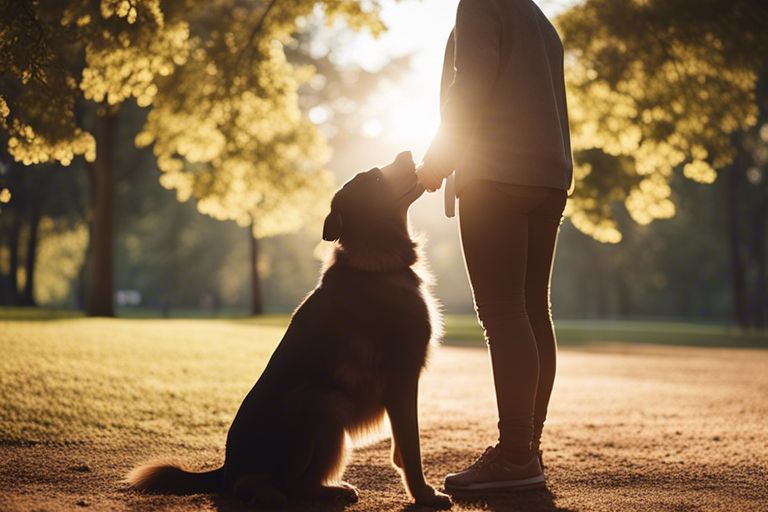With their unwavering loyalty, infectious playfulness, and undeniable affection, dogs have earned the title of man’s best friend. But what is it about these four-legged companions that make them so beloved by humans? Delve into the fascinating world of canine cognition, biology, and behavior as we explore the science behind why dogs hold a special place in our hearts and homes. From their evolutionary history to their emotional intelligence, we will uncover the unique bond between humans and dogs that has stood the test of time.
Key Takeaways:
- Dogs form deep emotional bonds with humans: Research shows that dogs have the ability to form strong emotional attachments with humans, leading to the term “man’s best friend.”
- Oxytocin plays a key role in the human-dog bond: When dogs stare into their owner’s eyes, both dogs and humans experience an increase in oxytocin levels. This hormone is known as the “love hormone” and is responsible for strengthening the bond between humans and dogs.
- Dogs provide numerous health benefits: Owning a dog has been linked to reduced stress, lower blood pressure, and increased physical activity, all of which contribute to improved overall health and well-being.
Exploring the Science of Attachment
The Role of Oxytocin in Bonding
The bonding between humans and dogs is intricately tied to the hormone oxytocin, often referred to as the “love hormone” or “bonding hormone.” Oxytocin is released in both humans and dogs during positive social interactions, reinforcing the emotional connection between the two species.
Behavioral Studies on Dog-Human Interactions
Exploring the behavioral studies on dog-human interactions sheds light on the intricate dynamics that shape the bond between these two species. Research has shown that dogs display attachment behaviors towards their human companions similar to that of a child towards a caregiver, indicating a profound level of emotional connection.
With dogs exhibiting behaviors such as seeking proximity, displaying physical affection, and showing signs of distress when separated from their owners, the relationship between humans and dogs mirrors the attachment bonds seen in parent-child relationships. These studies emphasize the depth of emotional connection and mutual bond that develops between dogs and their human counterparts.

Communication and Empathy
Understanding Dog’s Emotional Intelligence
Now, let’s explore into the fascinating world of canine emotional intelligence. Dogs have the remarkable ability to understand human emotions and respond with empathy. Research has shown that dogs can interpret human facial expressions, tone of voice, and body language to gauge our feelings and act accordingly. This emotional intelligence enables them to form deep bonds with their human companions, making them truly man’s best friend.
Nonverbal Communication and Signaling
Intelligence, Dogs communicate primarily through nonverbal cues, using their body language, facial expressions, and vocalizations to convey their emotions and needs. By observing a dog’s posture, tail wagging, ear position, and vocal signals, we can better understand what our furry friends are trying to communicate. It is important for pet owners to learn how to interpret these nonverbal cues to strengthen their bond with their canine companions and ensure their well-being.
A dog’s wagging tail does not always signify happiness; it can also indicate excitement, agitation, or even fear. Similarly, a dog’s ears pinned back could mean they are feeling anxious or submissive. Understanding these subtle nonverbal cues is crucial for deciphering your dog’s emotions and responding appropriately to ensure a positive interaction.
The Benefits of Canine Companionship
Emotional and Physical Health Advantages
With the unconditional love and companionship that dogs provide, it’s no wonder they are often referred to as man’s best friend. Studies have shown that owning a dog can have a positive impact on both emotional and physical health. The presence of a furry friend can reduce feelings of loneliness and anxiety, lower blood pressure, and increase levels of serotonin and dopamine, the feel-good hormones.
Dogs in Therapeutic and Service Roles
Companionship with dogs goes beyond just the emotional benefits. Dogs play a crucial role in therapeutic and service settings, providing assistance to individuals with various disabilities or health conditions. Therapy dogs offer comfort and support in hospitals, nursing homes, and schools, while service dogs are trained to perform specific tasks to help individuals with physical or mental disabilities lead more independent lives. Their loyalty and dedication in these roles are truly remarkable.
The Evolution of Puppy Love
Selective Breeding and Behavioral Traits
The domestication of dogs dates back thousands of years, with early humans selectively breeding wolves for behavioral traits that suited their needs. Through this intentional breeding process, humans created dogs with various abilities such as herding, hunting, and guarding. This close partnership between humans and dogs led to the development of a unique bond based on mutual companionship and cooperation.
The Impact of Dogs on Human Evolution
All along the journey of human evolution, dogs played a significant role in shaping our development. As loyal companions, dogs provided early humans with protection, assistance in hunting, and even warmth during cold nights. The bond between humans and dogs goes beyond mere companionship, contributing to the emotional and physical well-being of both species. This symbiotic relationship has undoubtedly influenced the evolution of human societies and the way we perceive and interact with the world around us.
Evolution of dog breeds has been a result of human intervention, aiming to enhance certain traits in dogs that are beneficial for specific purposes. Over generations, this selective breeding has led to the diverse range of dog breeds we see today, each with unique characteristics and abilities that cater to different human needs. From tiny companions to mighty protectors, dogs have adapted to various roles in human societies, solidifying their position as our faithful and beloved companions.
To wrap up
Ultimately, the bond between dogs and humans goes beyond just companionship; it is rooted in a complex interplay of evolutionary, biological, and psychological factors. From their ability to understand human emotions to their unwavering loyalty and companionship, dogs have truly earned the title of “man’s best friend.” Through centuries of coevolution, dogs have ingrained themselves in our lives, providing us with not only emotional support but also numerous physical and mental health benefits. As our furry companions continue to touch our lives in profound ways, it is clear that the science behind why dogs are man’s best friend is a multifaceted and fascinating subject that continues to be explored and appreciated.
FAQ
Q: Why are dogs considered man’s best friend?
A: Dogs are considered man’s best friend due to their unwavering loyalty, companionship, and ability to provide emotional support. They have a unique ability to understand human emotions and form deep bonds with their owners, making them cherished companions.
Q: How do dogs benefit our physical health?
A: Interacting with dogs has been shown to have numerous physical health benefits. Studies have found that owning a dog can lead to lower blood pressure, reduced risk of heart disease, and increased physical activity due to the need for regular exercise and walks.
Q: What is the scientific explanation behind the bond between dogs and humans?
A: The bond between dogs and humans can be attributed to the release of oxytocin, often referred to as the “love hormone,” when humans interact with dogs. This hormone plays a key role in bonding and trust between individuals, leading to the strong emotional connection that many people feel towards their canine companions.

